“I barely know what living feels like…”
Sometimes, under severe stress or trauma, our brains ‘step us out of ourselves’, to give us the time and – almost literally – the headspace needed to realign our thoughts. People say – or used to, I’ve not heard the expression recently – ‘beside myself with grief’ and similar. This is the phenomenon that the metaphor so beautifully describes. We’re not there: mentally, we’re somewhere else.
With most of us the trauma passes, the balance restores and, back in our own heads, feeling once again as if we’re completely ‘there’, we go on with our life.
But sometimes the upset’s so severe, so fundamental, that this doesn’t happen. Sometimes there are relapses, or prolonged periods of ‘dissociation’. Sometimes, real life becomes the exception rather than the rule.
Victims of this condition – Depersonalisation Disorder (DPD) – are able to carry on doing everything they must – holding down a job, looking after a family, all the usual social interactions, but don’t feel they’re actually there, doing those things. The quote at the top of this piece describes a sufferer’s almost Existentialist longing for her ‘normal’ state of ‘connected-ness’.
But there’s more:
Is it possible that, instead of being the result of a memorable trauma, the ‘damage’ – whatever it may be – that gave rise to the state of depersonalisation, had always been there, or had been set-off before memory dawns, when the person was still very young?
If you had this, you’d never know the ‘normal’ state of ‘being connected’ – of stitching together conscious experience as a continuum like everybody else – feels like. You’d develop coping mechanisms to ‘get into other people’s heads’ at times when this is needed and learn, by imitation, how to socialise.
Able to do everything expected of you, and unsuspected of fault by anyone else, you’d go through life never knowing that this isn’t how it’s supposed to be…

